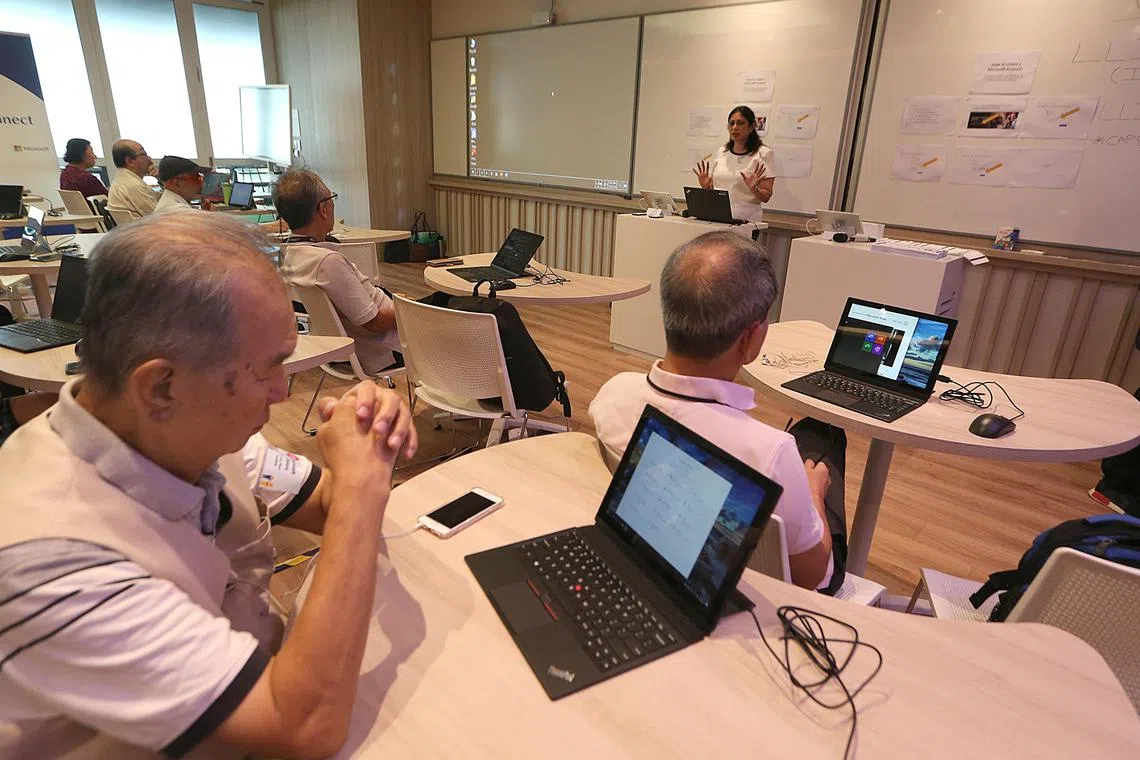To spur tech jobs, ministries eye digital opportunities and innovation
Sign up now: Get ST's newsletters delivered to your inbox

The expansion of digital inclusion efforts is among plans to grow the digital, information and media literacy of Singaporeans.
PHOTO: LIANHE ZAOBAO FILE
Follow topic:
SINGAPORE – People and companies in Singapore will get help to upskill and deepen their proficiencies in high-demand areas such as 5G, artificial intelligence (AI) and cyber security, as the Ministry of Communications and Information (MCI) rolls out initiatives to ensure the country keeps pace with technology.
Apart from job opportunities in the digital age, Communications and Information Minister Josephine Teo outlined plans to sustain trust in the communication and digital domains in her ministry’s addendum to the President’s Address.
Codes of practice for social media services and app stores, and advisory guidelines for the safeguarding of personal data are in place to protect users. There are also plans to grow Singaporeans’ digital, information and media literacy.
Digital inclusion will be expanded by providing subsidised devices and Internet access under the DigitalAccess@Home and Mobile Access for Seniors schemes, as well as tailoring training and assistance for the elderly and other groups through the Infocomm Media Development Authority’s SG Digital Office.
Through the TechSkills Accelerator for ITE and Polytechnics Alliance, MCI will work with the Ministry of Manpower and Ministry of Education as well as industry parties to maintain access to job opportunities.
Collaboration among the institutes of higher learning, public research institutes and industry is being fostered by the National Research Foundation (NRF) to hasten the commercialisation of technology in medical diagnostics and additive manufacturing.
In creating jobs for Singaporeans, NRF said capabilities in strategic technology areas are being advanced even as public research institutes and universities work with industry players through corporate laboratories and joint projects.
Businesses can also tap support from Centres of Innovation run by Enterprise Singapore to build products.
Such collaborations are to develop materials, designs and manufacturing techniques for areas such as wearables, communications equipment and vehicles, and expand the base of semiconductor manufacturing.
NRF will continue to attract top AI talent and spur the development of innovative solutions that generate value for businesses and society here.
Venture capital funding in Singapore’s start-up ecosystem grew by more than 20 times, from about $500 million in 2011 to about $11 billion in 2022. This includes investing in promising deep-tech start-ups, noted NRF.
NRF will provide customised financial support for promising enterprises to build sustained research and development and innovation capacity as part of the Singapore Global Enterprises Initiative to promote more locally grown, high-growth and globally competitive companies.
The Monetary Authority of Singapore will instil Web 3.0, AI and green fintech in promising fintech start-ups.
It is targeting to create 3,000 to 4,000 jobs per year in the financial services sector from 2021 to 2025. Efforts are being accelerated to develop digital infrastructure and platforms for industry efficiency, to access new markets and to promote new models in digital finance.

